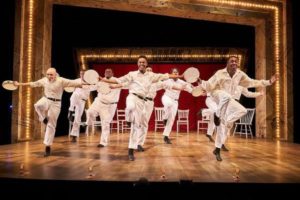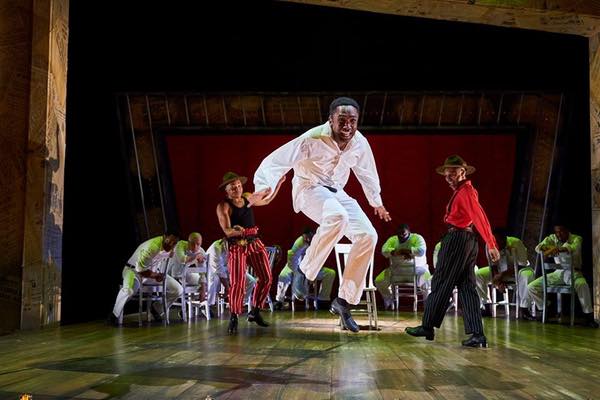THEATER REVIEW: “The Scottsboro Boys” @ Beck Center by Laura Kennelly
Through Sun 2/23
Brilliant and daring. The latest Baldwin Wallace University/Beck Center collaborative production, John Kander and Fred Ebb’s The Scottsboro Boys, directed and choreographed by Jon Martinez, provides a stunning (albeit starkly condensed) musical sketch of a real event.
In 1931, nine African-American young men (ages 13 to 20) were arrested in Alabama on charges that they had raped two women who had been hitching a ride (train hopping) on the same train. Over the years, evidence and history has shown that they were falsely accused and that what happened to them was a tragedy.
While dressed up as an old-fashioned minstrel show, The Scottsboro Boys is a serious show. Like the works of Bertolt Brecht, it has jokes — some funny, some bitter. But they don’t offset its story’s somber side. To be explicit, it doesn’t flinch from the ugly truth about racism.
So it’s not a musical walk in the park, or if it is, it’s a scary walk in the park that takes a look at society’s ugly truths. But, it’s also a show full of talented performers, all but one (Greg Violand) students at Baldwin Wallace. Their vitality and jaw-dropping dance skills, plus fine vocal and acting chops, all combine to make a mesmerizing night at the theatre.
An appropriately authoritative Violand, as the “Interlocutor” (i.e. White Man) serves as the Master of Ceremonies. Violand tells us he’s going to offer a brand-new show. As Interlocutor, he orders the African-American characters (that is, all the other actors) around throughout the show.
Violand starts the action by delegating Mr. Bones (Nick Drake) and Mr. Tambo (Charles Mayhew Miller) as his assistants. Naturally (given the times) they do his bidding without question. Both Drake and Miller offer edgy, assured performances in their pivotal roles (and when the talented duo dances, the thought “Can humans really do that?” comes to mind frequently). Just to make things more fun (and under Violand’s orders), they also fill other roles, such as the Attorney General and lawyer Samuel Leibowitz.
Over a dozen musical numbers and dances make the story race along. There’s action all the time and the fact that there’s no intermission seems irrelevant — time just flies.
At one point, as the “wronged women,” Javar Parker (as Victoria Price) and Tavon Olds-Sample (Ruby Bates) make a delightful spectacle of their (lying) characters as they flounce around the stage singing “Alabama Ladies.”
Anthony Harris creates a heartrending, lovable Haywood Patterson. He does it through showing Patterson as a defiant, self-confident person (of course he does — that’s good acting), but he also does with his voice, especially in “Make Friends with the Truth” and “You Can’t Do Me.” When he and Jahir Hipps (as Eugene Williams) sing the ballad, “Go Back Home,” they break hearts.
Other Scottsboro Boys include Gordia Hayes, Marcus Martin, Jahir Hipps, Anthony Harris, Elijah Dawson, Brinden Harvey, and Savannah Cooper. Cooper is also dance captain.
And lastly, one mysterious character, The Lady (a dignified RhonniRose Mantilla), floats around the stage, observing, but not speaking until the end. In many ways, her presence signals the change to come. It’s a hopeful note to end a sad, bittersweet tale, all the sadder because it’s based in truth.
Additional credit for this professional-looking and -sounding production should go to Matthew Webb, orchestra director; Jordan Janota, scenic designer; Steve Shack, lighting designer, Susanne Houstle costume designer, and Carlton Guc, sound.

BOTTOM LINE: The Scottsboro Boys‘ 2010 Broadway presentation garnered twelve Tony Award nominations. It’s a fine and challenging show in the tradition of Kander and Ebb’s Cabaret and Chicago. Somehow having age-appropriate actors (the majority of whom are African-American, and all of whom seem Broadway ready) makes this production all the more touching and wonderful.

No comments:
Post a Comment